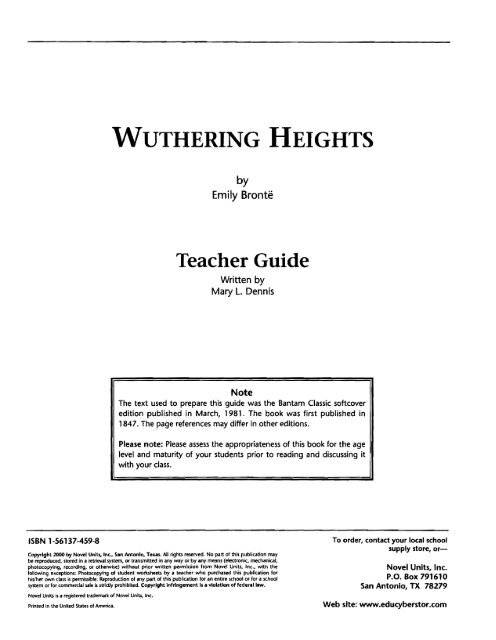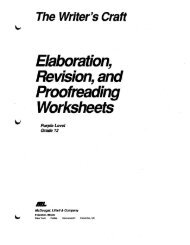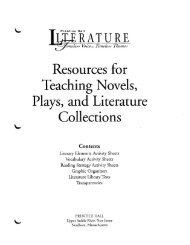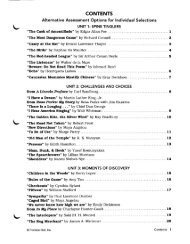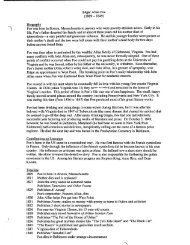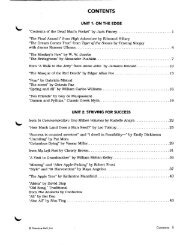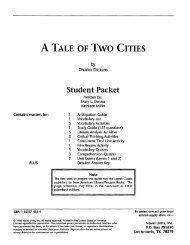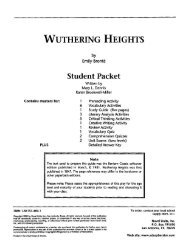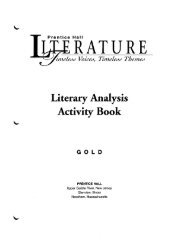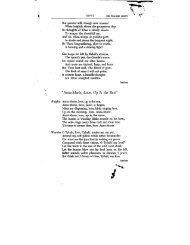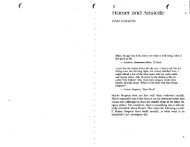WUTHERING HEIGHTS - PopulationMe.com
WUTHERING HEIGHTS - PopulationMe.com
WUTHERING HEIGHTS - PopulationMe.com
Create successful ePaper yourself
Turn your PDF publications into a flip-book with our unique Google optimized e-Paper software.
<strong>WUTHERING</strong> <strong>HEIGHTS</strong> <br />
by <br />
EmiIy Bronte <br />
Teacher Guide <br />
Written by <br />
Mary L Dennis <br />
Note<br />
The text used to prepare this guide was the Bantam Classic softcover<br />
edition published in March, 1981. The book was first published in<br />
1847. The page references may differ in other editions.<br />
Please note: Please assess the appropriateness of this book for the age<br />
level and maturity of your students prior to reading and discussing it<br />
with your class.<br />
ISBN 1-56137-459-8<br />
Copyright 2000 by Novel Units, Inc., San Antonio, Texas. All rights reserved. No part of this publication may<br />
be reproduced. stored in a retrieval system, or transmitted in any way or by any means (electronic. mechanical,<br />
photocopying, recording, or otllerwise) without prior written permIssion from Novel Units, Inc., with the<br />
follOWing exceptions: Photocopying of student wor1
Table of Contents <br />
Introduction ...,......................................................................................... 3 <br />
Plot Summary" ....................................."...................................................4 <br />
Emily Bronte's Life ........................•...........................................•......•........7 <br />
Initiating Activities ...................................................................................8 <br />
Vocabulary, Discussion Questions,<br />
Activities, Writing Assignments<br />
Chapters 1 - 6 ...."."." .."....."... ""....... ""..".. 11 ••••••••• ""•••••••••••••••• " •••••• " •• "" •• " ••• " •••••".1 0 <br />
Chapters 7 - 12 ................"........ "".".. ""....................................................... 13 <br />
Chapters 13 - 18 ...................................................................................... 17 <br />
Chapters 19 - 24 ......................................................................................19 <br />
Character/Concept Attribute Webs ..........................................................21 <br />
Chapters 25 - 29 ......................................................................................24 <br />
Chapters 30 - 34 ......................................................................................27 <br />
Post-Reading Discussion Questions .......................................................29 <br />
Suggested Expository and Creative Writing Topics ..............................30 <br />
Extensio n Activities ......................................................................................32
INTRODUCTION<br />
In her "Preface and Biographical Notation" to the second edition of Wuthering Heights, the<br />
author's sister, Charlotte, described the novel as " ... hewn in a wild workshop, with simple<br />
tools, out of homely materials. It is rustic all through. It is moorish, and wild, and knotty as a<br />
root of heath." In the lengthy Preface, Charlotte seemed to be making an attempt to<br />
apologize to the public and to explain the novel to those who had found it disagreeable<br />
because of its revenge theme, violent scenes, and bizarre characters. Most novels popular at<br />
the time-especially those written by women-were light romances with happy endings,<br />
centering around the plot of "girl-must-decide-between-two-men."<br />
Emily Bronte took this plot many steps further, and while her version may have shocked her<br />
contemporaries, Wuthering Heights is the novel that has endured as literature, considered by<br />
some to be the finest novel in the English language. Cathy and Heathcliff have be<strong>com</strong>e<br />
standard-bearers for the tragic romance theme, and the novel has been made into a movie<br />
four times. Its author, who died the year after it was published, had no idea of her success.<br />
Wuthering Heights straddles the traditions of both the Romantic and the Victorian periods, a<br />
cross between the Gothic (Romantic) and Domestic-Realist (Victorian). Its emphasis on<br />
intense passions, idealization of childhood, glorification of nature, and celebration of<br />
individualism all link the novel with the Romantic period, but there is also a leaning toward<br />
<strong>com</strong>munity, family, and duty, which are more Victorian concerns. It is, in fact, Catherine<br />
Earnshaw's vacillation between a life in the "real" world with Edgar Linton and a wild, spiritual<br />
kind of life with Heathcliff that creates the conflict and destroys the two lovers.<br />
Emily Bronte's tightly-condensed style, imagery, and descriptive passages are <strong>com</strong>bined with<br />
her ability to portray the deep feelings of her characters. The themes of revenge, romantic<br />
love, and the struggle between social classes are timeless ones to which students today can<br />
readily relate.<br />
While the novel is not an example of either waning Romanticism or emerging Victorianism, its<br />
structure-the use of first-person narration in several forms-is notable. Mostly, though,<br />
students will appreciate the passionate love story and the suspenseful plot that have made<br />
Wuthering Heights a classic.<br />
C> Novel Units, Inc. All rights reserved<br />
3
PLOT SUMMARY<br />
Note: The summary is divided into sections which correlate with the Reading Assignments in<br />
the Discussion Section which begins on page 8.<br />
Chapters 1-6<br />
Mr. Lockwood, the first narrator we meet, arrives at Wuthering Heights because he is leasing<br />
the country estate, Thrushcross Grange, from its owner, Mr. Heathcliff. The dilapidated farm<br />
and plain furnishings confuse Lockwood, for the Grange is considerably more upscale. Mr.<br />
Heathcliff is also an enigma. He is not particularly happy to see Mr. Lockwood and finds it<br />
amusing when his ferocious dogs attack his tenant.<br />
On Lockwood's next visit, he sees a sullen young man and a lovely but haughty young woman<br />
who Heathcliff scornfully calls his daughter-in-law, although the young man is not his son. The<br />
girl is also berated by Joseph, a sanctimonious old servant. Lockwood is unable to leave that<br />
evening due to a snowstorm. He is treated with utter lack of hospitality, but is finally shown to<br />
a room upstairs. The names "Catherine Earnshaw," "Catherine Unton," and "Catherine<br />
Heathcliff" are scratched on the ledge, and Lockwood amuses himself by reading some notes<br />
and diaries written 25 years before by Catherine Earnshaw. They describe the cruel treatment<br />
she and, especially, Heathcliff suffered at the hand of someone named Hindley. Later,<br />
Lockwood is disturbed by a nightmare in which Catherine linton grabs his hand in her icy one<br />
and begs him to let her in. Heathcliff hears Lockwood's shrieks and rushes into the room,<br />
telling Lockwood to sleep elsewhere and calling, "Cathyl Come in! Come in!"<br />
By the time Lockwood arrives at Thrushcross Grange the next morning, he is ill. As he<br />
recuperates, his housekeeper, Nelly Dean, answers his questions about the strange goings-on<br />
at Wuthering Heights. At this point, Nelly Dean takes over as narrator.<br />
Mr. Lockwood learns that the Untons previously owned Thrushcross Grange, that the sullen<br />
young rustic is the son of the late Hindley Earnshaw, brother of Catherine Earnshaw-Linton,<br />
and that the young woman is Hareton's cousin, Catherine Linton, the only child of Edgar<br />
linton and Catherine Earnshaw.<br />
Nelly's mother worked at Wuthering Heights and Nelly was a playmate of the Earnshaw<br />
children. She recalls the arrival of Heathcliff, a starving foundling brought home by the<br />
children's father, and relates how he became a favorite of Mr. Earnshaw and Catherine, but<br />
was detested by Hindley, who justly felt replaced and so tormented Heathcliff. Shortly after his<br />
mother's death, Hindley was sent away to school. With Mr. Earnshaw ill, Cathy and Heathcliff<br />
ran wild on the moors, much to the consternation of old Joseph. On Mr. Earnshaw's death,<br />
© Novel Units, Inc. All rights reserved<br />
4
Hindley returned to take charge of the house, bringing his new wife, Frances, with him. He<br />
sent Heathcliff to the servant's quarters, made him labor on the farm, and terminated his<br />
education-but Heathcliff and Cathy continued their devoted friendship and wild antics.<br />
While they were peering through the windows at Thrushcross Grange one afternoon,<br />
Catherine was attacked by one of the watchdogs. She remained at Thrushcross Grange for<br />
treatment for five weeks, as the Lintons were concerned at her lack of supervision at home.<br />
Chapters 7-12<br />
Catherine returned from the Grange a fine young woman, chiding Heathcliff for his slovenly<br />
appearance and hurting his pride. Heathcliff refused to be civil to the young Lintons, Isabella<br />
and Edgar, when they visited, and told Nelly Dean he planned to settle the score with Hindley,<br />
who was now a distraught widower and the father of a baby boy, Hareton. Hindley began<br />
drinking and gaming heavily, be<strong>com</strong>ing increasingly cruel to Heathcliff. Meanwhile,<br />
Catherine decided to marry Edgar Linton. It seemed the proper thing to do, although she<br />
told Nelly she would always love Heathcliff, who overheard her and immediately disappeared.<br />
Catherine, waiting in the rain for him to return, became gravely ill. She convalesced at<br />
Thrushcross Grange, however Mr. and Mrs. Linton both caught the fever and died. Catherine<br />
and Edgar enjoyed a fairly happy marriage until Heathcliff returned and Edgar became jealous<br />
over Catherine's obvious affection for him. When Nelly visited Wuthering Heights, she found<br />
Hareton had fallen under Heathcliff's evil influence. As part of his vengeance scheme,<br />
Heathcliff planned to turn Hindley's son into a brute.<br />
Matters worsened when Isabella developed an infatuation for Heathcliff, causing a terrible<br />
fight between himself and Edgar. Soon after, Heathcliff ran away with Isabella, and Catherine<br />
began to exhibit signs of madness, speaking of her imminent death and her plans to haunt<br />
Heathcliff. Catherine made a marginal recovery, and Edgar looked forward to the birth of their<br />
child, hoping for a son and heir to keep Thrushcross Grange away from Heathcliff and<br />
Isabella, who were now living at Wuthering Heights. In a letter to Nelly, Isabella confessed she<br />
had made a terrible mistake-Heathcliff was abusing her horribly, and Hindley was gambling<br />
all his property away to Heathcliff and going into drunken rages. Heathcliff pressured Nelly to<br />
arrange a meeting with Catherine. They argued, then embraced passionately and forgave all.<br />
Catherine collapsed and died that night, giving birth to a premature, sickly daughter, named<br />
Catherine after her mother. Isabella soon escaped from Wuthering Heights and went to<br />
London, where she bore a son, Linton. Isabella died when Linton was 12, and by that time<br />
Heathcliff had taken everything from Hindley, who also died, leaving his son Hareton a<br />
beggar. Little Cathy was a <strong>com</strong>fort to Edgar, but somewhat willful, like her mother. On a<br />
forbidden pony ride off Grange property, 1 2-year-old Cathy found her way to Wuthering<br />
Heights and passed an enjoyable few hours with Hareton, although she could not quite<br />
believe he was her cousin.<br />
© Novel Units, Inc. All rights reserved<br />
5
Chapters 19-24<br />
After Isabella died, Edgar went to London to bring Linton to Thrushcross Grange. Heathcliff,<br />
however, demanded that his son live at Wuthering Heights. Nelly, delivering Linton to the<br />
Heights, was concerned at Heathcliff's contemptuous attitude toward Linton, who was peevish<br />
and sickly. Cathy didn't see her cousin for four years, when it became clear that Heathcliff<br />
planned for Cathy and Linton to marry, securing Heathcliff's claim on Thrushcross Grange.<br />
Hareton, who was illiterate, became a joke between Linton and Cathy, who corresponded<br />
secretly until discovered by Nelly, who prevented further correspondence. When Edgar Linton<br />
became ill, Cathy became his full-time nurse. Edgar insisted she must get some air and<br />
exercise, so she and Nelly walked on the moor, there encountering Heathcliff, who insisted<br />
Linton was dying of a broken heart and must see Cathy immediately. Linton and Cathy<br />
quarreled about their parents, but soon made up. The long foray in the rain caused Nelly to be<br />
confined to bed with a bad cold, never dreaming that Cathy was spending her evenings at<br />
Wuthering Heights. Cathy finally confessed where she had been in the evenings; Edgar was<br />
informed, and said Linton was wel<strong>com</strong>e at the Grange but Cathy must not go to the Heights.<br />
Chapters 25-29<br />
Edgar was aware of his own impending death, and felt Cathy would at least have her home at<br />
Thrushcross Grange if she married Linton. Linton was forbidden to go to the Grange, so<br />
meetings between the pair had to take place on the moor, with Nelly as chaperone. At their<br />
first meeting, Linton was weak and ill, but seemed terrified for Cathy to leave. Since Edgar's<br />
health was growing worse, Cathy and Nelly thought it best to pretend a happy marriage was<br />
in the making between Cathy and Linton, and that Linton was perfectly healthy and<br />
<strong>com</strong>petent. Actually, Cathy suspected Heathcliff was behind Linton's actions. Her suspicions<br />
were soon confirmed-Linton lured Cathy and Nelly to the Heights and Heathcliff imprisoned<br />
them there, insisting Cathy marry Linton. Nelly was kept in a room for five days, during which<br />
time the marriage took place. Although Nelly was released, Cathy remained a prisoner,<br />
worrying that her father might have already died. In his one brave and selfless act, Linton<br />
helped Cathy escape in time to bid her dying father farewell. Once Edgar was buried, Cathy<br />
had to return to a miserable life at the Heights. Heathcliff told Nelly he had uncovered and<br />
opened Catherine's coffin and had seen her face in the dust. He had already paid the sexton<br />
to bury him next to her with the facing sides of the coffins removed to allow their dust to<br />
mingle. Heathcliff said Cathy had haunted him for 18 years.<br />
Chapters 30-34<br />
Linton became gravely ill, but Heathcliff refused to send for a doctor, and Cathy tended him<br />
without help. After his death, Heathcliff showed her the will Linton had singed, leaving Cathy<br />
destitute.<br />
C> Novel Units, Inc. All rights reserved<br />
6
At this point, we return to Mr. Lockwood as narrator. It was the spring after his long illness.<br />
Mr. Lockwood went to Wuthering Heights to tell Heathcliff he planned to return to London<br />
but would pay the rent on the Grange for the agreed time. Nelly gave Lockwood a note for<br />
Cathy, which Hareton seized but then, relenting at the sight of Cathy's tears, gave to her.<br />
Cathy was now an unpaid servant, along with Hareton. She didn't get along well with<br />
Hareton, constantly making fun of him for his rustic behavior and his illiteracy.<br />
Six months later, Lockwood returns to Thrushcross Grange since he is in the area, but finds<br />
Nelly Dean is now at Wuthering Heights. When he arrives there, he is surprised to see Cathy<br />
tutoring Hareton and kissing him when he does well. Nelly Dean once again takes over as<br />
narrator, tying up the loose ends for Mr. Lockwood.<br />
Cathy and Hareton became allies, with Hareton protecting Cathy from Heathcliff. Heathcliff<br />
had lost his desire for revenge anyway and had be<strong>com</strong>e totally obsessed with joining<br />
Catherine in death. One night Nelly Dean found him in Catherine's old room, dead, with a<br />
frightening sneer on his face. The villagers now swear that Heathcliff walks at night, and old<br />
Joseph insists that every rainy night since Heathcliff's death, he has seen two spirits, a man<br />
and a woman, walking on the moors.<br />
EMILY BRONTE'S LIFE<br />
Emily Bronte is one of the most mysterious and intriguing literary figures. One critic called<br />
her life "biographer-proof." There are few letters or journal entries, so her history <strong>com</strong>es in<br />
the form of what others said or wrote about her, particularly from the Biographical Notice<br />
written by her sister for the second edition of Wuthering Heights.<br />
What we do know is that Emily Jane Bronte was born July 30, 1818, the fifth child of six.<br />
When Emily was two years old, her father, Reverend Patrick Bronte, moved the family to the<br />
parsonage at Haworth, Yorkshire, where Emily spent most of her life.<br />
Charlotte Bronte noted that since the remote Haworth offered little in terms of education or<br />
entertainment, the children had to amuse themselves. This they did by reading avidly and<br />
writing and acting out plays. Emily and her sister Anne wrote a series of poems called the<br />
Saga of Gondal, which take place in an imaginary kingdom. Some of the themes and<br />
characters in the Gondal poems are recognizable in Wuthering Heights.<br />
According to Charlotte, "liberty was the breath of Emily's nostrils." Her short stays at various<br />
boarding schools showed her unwillingness to adjust to disciplined routine and artificial<br />
Q Novel Units, Inc.<br />
7<br />
All rights reserved
ehavior. She preferred the freedom of the moors. Her love of nature is easily seen in<br />
Wuthering Heights as well as in her poetry. Although she had little interest in her father's<br />
formal religion, she has been called a mystic, and her theme of the spiritual bond between<br />
Catherine and Heathcliff bears this out.<br />
Emily used the pen name "Ellis Bell" because l<br />
as Charlotte put it, " ... we had a vague<br />
impression that authoresses are liable to be looked on with prejudice." Emily experimented<br />
with form and theme, and Wuthering Heights was considered rough, savage, and vulgar by its<br />
first reviewers, who assumed the author was masculine. Imagine their horror when Emily's<br />
feminine identity was revealed!<br />
Before her own early death in 1848, Emily had suffered the loss of her mother (when Emily<br />
was 3), of two of her sisters (when Emily was 6)1 and of her brother (when Emily was 29). Her<br />
brother's death was particularly tragic because it was a slow moral and physical decline caused<br />
by the abuse of drugs. It was at her brother's funeral that Emily caught cold. Complications<br />
ensued l<br />
and she never recovered. She died at age 30, in 1848, just one year after her only<br />
novel, Wuthering Heights, was published.<br />
INITIATING ACTIVITIES<br />
1. Read Emily Bronte's poem, "Remembrance/' which appears in most English literature<br />
anthologies. Discuss the theme of the poem, a love which defies death. ("All my life's<br />
bliss is in the grave with thee.'/) Ask the students how they picture the poet, and if they<br />
believe they could ever feel this way if someone they loved died. (Activity #14 in the<br />
Novel Units Student Packet uses this poem.)<br />
2. Discuss the Victorian Age:<br />
Political/Social Climate<br />
This period is named for Queen Victoria, who reigned from 1837-1901. During this time<br />
the pivotal city of Western civilization shifted from Paris to london. This was largely due<br />
to England's being the first country to industrialize. The economy shifted from an<br />
agricultural base to a manufacturing one, leading to problems as cities became<br />
overcrowded. The living and working conditions of the poor remained abominable, but<br />
power was finally wrested from the landed gentry and passed into the hands of the<br />
middle class. This was largely due to the Reform Bill of 1832, which gave the vote to<br />
middle-class men whose property cost more than 10 pounds annual rent. Women and<br />
the poor were still excluded. SOciallYI Victorians stressed proper manners and morals.<br />
There was an acute awareness of Man's relationship to God, and of time past, present,<br />
and future.<br />
C> Novel Units, Inc. All rights reserved<br />
8
Role of Women<br />
Married women were not allowed to own and handle their own property, but had to<br />
bow to the wishes of their husbands. Poor women slaved in factories and mines 16<br />
hours a day. Women's education consisted of finishing school, where they would learn<br />
about domestic duties and how to be properly subordinate <strong>com</strong>panions to men. The<br />
Married Women's Property Acts (1870-1908) and the establishment of a women's<br />
college in London in 1848 began to bring change in these areas.<br />
Victorian literature<br />
The literature of the age was riddled with moral taboos, but many authors found ways<br />
around them. Victorian audiences wanted didactic, edifying novels-advice on how to<br />
best live in a changing society-so most novels centered on the struggles of a<br />
protagonist to find himself or herself in relation to that society. Victorian novelists of<br />
note: Thomas Hardy, Charlotte and Emily Bronte, William Makepeace Thackeray,<br />
Anthony Trollope, George Eliot, and George Meredith.<br />
The poets of the age experimented with form and subject matter. Poets to note are<br />
Swinburne, Gerard Manley Hopkins, Robert and Elizabeth Barrett Browning, Alfred,<br />
Lord Tennyson, Dante Gabriel and Christina Rosetti, and Matthew Arnold.<br />
Medicine<br />
Immunizations for <strong>com</strong>mon illnesses were not yet developed, and there were no<br />
antibiotics to cure infections. Sanitary conditions left a lot to be desired. It was not<br />
unusual for women to die in childbirth, for infants and children to die of childhood<br />
diseases, and for adults to die young. Students should take note of the number of<br />
characters in Wuthering Heights who "catch cold" due to being out in the weather. We<br />
know now that colds are caused by viruses, but it was a <strong>com</strong>mon belief in Victorian<br />
times that getting wet and chilled could cause you to "catch your death of cold."<br />
Social Classes<br />
Wealthy people lived in large homes in the country and paid small wages to servants<br />
and laborers who worked the land and saw to their needs.<br />
3. Anticipation Guide. (See Novel Units Student Packet, Activity # 7) Students react to<br />
questions and statements relevant to themes and ideas they will meet in the novel.<br />
They should share their answers with a partner, then review their responses after<br />
finishing the novel.<br />
4. Ideas to Discuss/Brainstorm: love, hate, revenge, the supernatural, the word<br />
"wuthering," the importance of setting in a novel, the difference between freedom<br />
and constraint in social, religious, and legal situations.<br />
© Novel Units, Inc. All rights reserved<br />
9
DISCUSSION QUESTIONS • VOCABULARY<br />
WRITING SUGGESTIONS • ACTIVITIES<br />
Note: We have suggested that students keep a Reading Journal as they read this novel. The<br />
Reading Journal has several parts: a Vocabulary Section, Reading Response, and a<br />
section for <strong>com</strong>pleting writing assignments and other activities. You will probably want<br />
to familiarize students with the parts of their Journals and the procedure you will follow<br />
in collecting and evaluating them before you begin reading the novel.<br />
Vocabulary<br />
CHAPTERS 1-6, PAGES 1-46<br />
misanthropist 1 soliloquised 2 penetralium 2 sundry 3<br />
impertinence 3 tacit 4 physiognomy 5 dispatch 5<br />
prudential 6 laconic 6 churlish 7 assiduity 9<br />
sagacity 9 taciturn 10 miscreants 15 vapid 16<br />
asseverated 18 lachrymose 18 querulous 25 vindictive 35<br />
curate 36 vociferated 43 culpable 44 execrations 44<br />
Reading Journal: Vocabulary Activity<br />
Students will be able to ascertain many of the definitions from context. To help them zero in<br />
on those they need to look up, have them create a section in their Reading Journals which will<br />
look something like the suggestion below. Before reading, they can copy the section's list in<br />
the left-hand column. After reading, they can review the words in context, write their own<br />
synonyms for those words they feel they can define, and write dictionary definitions (one<br />
single synonym is usually easiest to remember) for the words that they feel less confidence in<br />
defining contextually.<br />
Word P .# Context Definition Dictiona Definition<br />
© Novel Units, Inc. All rights reserved<br />
10
Reading Journal: Reading Response<br />
Allow a few minutes at the end of each class period for students to make entries in the<br />
Reading Response sections of their Reading Journals. Since Wuthering Heights is written as a<br />
flashback, students should have many unanswered questions at the beginning, just as Mr.<br />
Lockwood did (Le., "Who is the unhappy young woman at Wuthering Heights?" "Why;s Mr.<br />
Heathcliff so rude and rough?"). As they continue to read, their original questions will be<br />
answered and other questions and thoughts will occur (Le., "Why did the Lintons send<br />
Heathcliff home but keep Catherine at the Grange for five weeks?"" or "/ think Catherine has<br />
made the wrong decision in marrying Edgar. ") The entries don't need to be long, and they can<br />
be as creative as students want them to be. A personal experience might <strong>com</strong>e to mind, or a<br />
poem might write itself, or something in the novel might remind a student of the words to a<br />
favorite song. The important thing is to keep students in touch with the reading and to relate<br />
what is happening in the novel to their own feelings, ideas, and experiences.<br />
Questions for Discussion<br />
1. What is the setting of the story? (the remote but beautiful Yorkshire moors, 1801)<br />
2. If you were Mr. Lockwood, would you have returned to Wuthering Heights after being<br />
attacked by the dogs? How do Mr. Heathcliff and the others seem to feel about their<br />
visitor? (They are very rude and inhospitable, making it clear they wish he had not<br />
<strong>com</strong>e by.)<br />
3. What errors does Lockwood make as he tries to decide what relationships exist<br />
between the people at Wuthering Heights? (He thinks the young woman is Heathcliff's<br />
wife, then that she is Hareton Earnshaw's wife and that he is Heathcliff's son.)<br />
4. How does the servant, joseph, treat Mrs. Heathcliff? (He considers her a witch and<br />
berates her loudly.) What is her reaction? (She assures him she is about to cast an evil<br />
spell on him.) Have you ever gone along with someone who is accusing you of things<br />
that aren't true? Why?<br />
5. Why did Lockwood have to stay overnight? (There was a snowstorm, and it would be<br />
too difficult for him to find his way home.) How far apart are Thrushcross Grange and<br />
Wuthering Heights? (four miles)<br />
6. What strange things happen as the night passes? (He reads the diaries of Catherine<br />
Earnshaw/Linton/Heathcliff which mention Hindley and his cruelty toward Heathcliff<br />
and herself. Later he has a nightmare involving the ghost of Catherine Linton trying to<br />
get in the window; at Lockwood's shrieks, Heathcliff enters and calls desperately for<br />
Cathy.)<br />
© Novel Units, Inc. All rights reserved<br />
11
7. Who takes over as narrator in Chapter 4? What makes her so capable of answering Mr.<br />
Lockwood's questions? (Nelly Dean, Lockwood's housekeeper, is now the narrator. Her<br />
mother worked at Wuthering Heights when she was a child, and she was a playmate of<br />
the Earnshaw children. She has remained in the employ of the family.)<br />
8. How did Heathcliff happen to <strong>com</strong>e to Wuthering Heights? (Mr. Earnshaw, Hareton's<br />
grandfather, found him starving on the streets of London and brought him home to be<br />
part of the family.) What problems developed? (Heathcliff became a favorite of Mr.<br />
Earnshaw and Cathy, but was detested and abused by Hindley.)<br />
9. What do you imagine is meant by "The unfortunate lad is the only one in all this parish<br />
that does not guess how he has been cheated." (page 30)?<br />
10. How does Nelly Dean describe Joseph? (page 36: "[He is] the wearisomest, selfrighteous<br />
pharisee that ever ransacked a Bible to rake the promises to himself and fling<br />
the curses on his neighbours." What does she mean? (He uses phrases in the Bible to<br />
accuse others of wrong-doing, but is no better himself.)<br />
11 . Why was Catherine difficult yet delightful? (She was wild and full of mischief, and very<br />
willful, yet she could be very sweet too and really meant no harm.)<br />
12. How did Catherine and Heathcliff get along as children? (They were very fond of one<br />
another; when Mr. Earnshaw died they consoled one another.) When Hindley returned,<br />
how did things change? (Heathcliff was sent to the servant's quarters and treated<br />
cruelly by Hindley; Catherine sympathized with him, and whenever possible the two<br />
ran away to the moors and spent the day there together.)<br />
13. Why did Catherine stay at Thrushcross Grange while Heathcliff was sent home? (She<br />
was attacked and injured by a watchdog while she and Heathcliff were eavesdropping.<br />
The Lintons probably felt responsible for the injury, and also saw Heathcliff as an "evil<br />
villain" and bad influence, and Hindley as irresponsible about his sister.)<br />
14. According to Heathcliff, what are the Linton children, Isabella and Edgar, like? (They <br />
are extremely spoiled, and Heathcliff remarks that he would not for a thousand lives <br />
exchange his unhappy life at Wuthering Heights for Edgar Linton's.) <br />
15. What was Hindley's reaction to Mr. Linton's advice that he keep better track of his <br />
family? (He told Heathcliff he would be dismissed if he so much as spoke a word to <br />
Catherine.) Do you think his request is impossible? <br />
Writing Suggestion: Imagine you are Hindley, away at school. Write the "poison pen" letter<br />
you send to Heathcliff. Write Heathcliff's reply.<br />
It:) Novel Units, Inc.<br />
12<br />
All rights reserved
CHAPTERS 7~12, PAGES 46-122<br />
Vocabulary<br />
blackguard 47 expostulated 52 cambric 53 equanimity 53<br />
prognosticate 55 consumption 57 dissipation 59 petulantly 62<br />
consternation 64 vociferating 66 vagaries 66 winsome 70<br />
munificent 81 dilatory 82 sizar 82 protract 88<br />
abjured 91 avarice 94 mitigating 97 propitiate 100<br />
approbation 102 <strong>com</strong>punction 108 pertinaciously 109 deranged 111<br />
paroxysm 115 recantation 118 scruple 119 sovereign 121<br />
Questions for Discussion<br />
1. How has Cathy changed after her stay at the Grange? to whose dismay? (She is now<br />
a refined and dignified young lady, to Heathcliff's dismay, as she teases him about<br />
being so slovenly and dirty.)<br />
2. Nelly Dean tells Heathcliff, "Proud people breed sad sorrows for themselves." Give an<br />
example of a situation where this would be true, or explain why you believe it's not<br />
true.)<br />
3. What advice does Nelly give Heathcliff about improving himself? (She tells him he<br />
needs to change his attitude to be more cheerful and less suspicious, and that he<br />
should invent high notions of his birth.)<br />
4. What happens, almost immediately, to show that Heathcliff didn't take Nelly's advice<br />
very seriously? (He throws a tureen of hot applesauce at Edgar.)<br />
5. What vow does Heathcliff make regarding Hindley? (that he will pay him back no<br />
matter how long it takes)<br />
6. Do you find it unusual that a servant would be as articulate as Nelly Dean is? How<br />
does Bronte make this seem plausible? (She has NelJy tell Mr. lockwood that she is<br />
well-disciplined and very well-read.)<br />
7. What sad event and happy event happen within the first few pages of Chapter 8? (A<br />
son is born to Hindley and Frances; Frances dies.)<br />
8. What is Hindley's reaction to the tragedy? (He gives himself up to <strong>com</strong>plete <br />
dissipation.) <br />
() Novel Units, Inc. All rights reserved<br />
13
9. In what ways is Catherine leading a double life? (She is as unruly and wild as ever when<br />
at home or out on the moor with Heathcliff, but when in the <strong>com</strong>pany of the Lintons<br />
she acts like a fine young lady.)<br />
10. How would you describe Edgar? (He is soft, spoiled, pale and fair, and has a great<br />
affection for Catherine.)<br />
11. What do you perceive as the real cause of Catherine's childish behavior toward Nelly<br />
and her quarrel with Edgar? (She is upset over the argument she had with Heathcliff<br />
just prior to Edgar's arrival, and is probably taking out her frustration on Nelly and<br />
Edgar.)<br />
12. Who takes care of Hareton? (Nelly) Is Hindley a good father? (No; he is drunk and<br />
half-crazy most of the time.) After Heathcliff saves Hareton's life, what does he<br />
immediately realize? (If he had let the baby fall to the floor and die, his revenge against<br />
Hindley would have been exacted-Hindley would have been plagued by the guilt of<br />
killing his son for the rest of his life.)<br />
13. What part of Catherine's conversation with Nelly on pages 69-75 does Heathcliff<br />
overhear? (that Cathy has decided to marry Edgar and that it would degrade her to<br />
marry Heathcliff) Which part does he NOT overhear? (that Cathy loves Heathcliff<br />
dearly; that their souls are the same; that nothing will keep her from being with him,<br />
even her marriage to Edgar)<br />
14. What similes appear on page 74 that help describe Cathy's feelings about Linton as<br />
opposed to Heathcliff? ("My love for Linton is like the foliage in the woods ... My love<br />
for Heathcliff resembles the eternal rocks beneath.")<br />
15. What are the results of Heathcliff's leaving Wuthering Heights? (Cathy catches a fever<br />
as she waits up for him in the rain; during her recuperation at the Grange, Mr. and Mrs.<br />
Linton both catch her illness and die. Three days after his father's death, Edgar marries<br />
Catherine.) How do you imagine Catherine felt at this point?<br />
16. How did Catherine adjust to married life? (For the most part, she was happy, but she<br />
had times when she was gloomy and silent.) Do you think her depressed periods were<br />
simply part of the normal ups and downs of life, or is there a special reason?<br />
17. What surprise visitor arrives at the Grange? (Heathcliff) How has he changed? (He is<br />
tall and well-built, dignified and intelligent-looking, however the half-civilized ferocity is<br />
still in his dark eyes.) How is he received by Catherine? (ecstatically) by Edgar? (very<br />
reluctantly)<br />
e> Novel Units, Inc. All rights reserved<br />
14
18. What <strong>com</strong>plication develops regarding Isabella? (She is infatuated with Heathcliff.)<br />
What advice is given to her by Catherine, Nelly, and her brother? (They all tell her she<br />
would be making a terrible mistake by getting involved with Heathcliff.) Do you find it<br />
odd that Catherine warns Isabella against him when she is so fond of Heathcliff herself?<br />
19. What upsets Nelly when she visits the Heights? (After she acted as a stand-in for his <br />
mother for five years, Hareton doesn't recognize Nelly, throws stones at her, and <br />
swears at her. She learns Heathcliff has taught him to swear at Hindley, who he calls <br />
"devil Daddy.") <br />
20. After seeing Heathcliff kissing Isabella, Nelly reports the action to Catherine and later to<br />
Edgar. What is the result? (Catherine and Heathcliff quarrel; then Edgar and<br />
Catherine quarrel. The disagreement escalates into violence when Heathcliff enters the<br />
scene and is struck by Edgar, who then runs away.)<br />
21. What decision does Catherine make after the trouble between her husband and her<br />
friend? [She is angry with both of them; since Edgar is jealous and Heathcliff is angry at<br />
her, she says, "I'll try to break their hearts by breaking my own." (p. 107)] Does Nelly<br />
take Catherine's threat very seriously at first? Why? (Nelly is used to Catherine's<br />
dramatic behavior and tantrums; she assumes this is more of the same.)<br />
22. After three days of fasting, how is Catherine behaving? (She is declining into a kind of<br />
feverish madness.)<br />
23. What promise does Catherine make on page 116? (that she will never let Heathcliff <br />
rest until he is with her in the grave) <br />
24. What has be<strong>com</strong>e of Isabella? (She and Heathcliff have run off together.) Who do you<br />
think tried to hang Isabella's dog, and would have succeeded if Nelly had not seen it?<br />
Writing Suggestions:<br />
(1) Catherine says if she married Heathcliff they would be beggars. Is it better to marry for<br />
love alone, or should the financial/social situation of your intended spouse be strongly<br />
considered? Has Catherine made the right decision, or should she have married Heathcliff?<br />
(2) Imagine Catherine and Heathcliff had married. Write a a typical scene from a day in their<br />
married life. Be sure to include dialogue which indicates, directly or indirectly, their feelings<br />
about the marriage.<br />
© Novel Units, Inc. All rights reserved<br />
15
Activity: Family TIes<br />
Elicit information from students to construct the family tree on a large piece of posterboard or<br />
on the overhead projector. At this point in the reading, the italicized events cannot yet be<br />
included. As your reading progresses, fill in these remaining characters and dates. This<br />
activity requires considerable skimming as well as critical thinking. Have the students look for<br />
specific dates and other references to time as they read. You might give extra credit to<br />
students who find the clues. (Novel Units Student Packet, Activity #9, provides an individual<br />
reproducible worksheet for this activity.<br />
Mr. Linton Mrs. Linton Mr. Earnshaw Mrs. Earnshaw<br />
d.1780 d.1780 d.1777 d.1773<br />
Heathcliff<br />
Isabella<br />
Edgar<br />
Catherine<br />
Hindley<br />
b.1764 b.1765 b.1762 b.1765 b.1757<br />
d. 1802 d. 7797 d. 7801 d. 1784 d. 7784<br />
Frances<br />
d.1778<br />
Linton Catherine Hareton<br />
b. 1784 b. 1784 b.1778<br />
d. 1801<br />
As a tie-in with this activity, you might have the students look for magazine pictures they think<br />
look like the various characters. Take votes as to which submissions are most like the<br />
characters, then paste the pictures near the names on the chart.<br />
You might have students draw their own family trees.<br />
© Novel Units, Inc.<br />
16<br />
All rights reserved
CHAPTERS 13-18, PAGES 122-182<br />
Vocabulary<br />
sanguine 122 despondency 123 obviate 124 wicket 126<br />
thible 130 slattern 134 importuned 135 alacrity 137<br />
abject 138 magisterial 139 diabolical 139 quiescence 140<br />
insipid 141 disquietude 141 iteration 141 appellation 141<br />
dree 142 audacity 144 scintillating 146 heterodox 151<br />
odious 159 <strong>com</strong>minations 181<br />
Questions for Discussion<br />
1. How long did Heathcliff and Isabella stay away? (two months) What happened while<br />
they were gone? (Catherine developed a brain fever.) Who is the IImere ruin of<br />
humanityll to whom Dr. Kenneth refers? (Catherine)<br />
2. In spite of Catherine's serious illness, there is some cause for hope. What is that?<br />
(Catherine is expecting a baby.) Why is this important to Edgar? (He hopes for a son<br />
and heir-otherwise, should something happen to him, Thrushcross Grange will go to<br />
Isabella, which in effect means it will go to Heathcliff.)<br />
3. Summarize Isabella's note to Nelly. (She relates that they are now at Wuthering<br />
Heights, and that she realizes she has made a terrible mistake. She is abused by<br />
Heathcliff, who she calls a devil; Hindley, who has lost most of his property to Heathcliff<br />
in gambling, is on the verge of madness. Hareton is a little ruffian, and Joseph is rude<br />
and continues with his religious rantings.) Why doesn't Isabella just leave? (She has<br />
nowhere to go-Edgar has disowned her, although he claims she disowned him.)<br />
4. What does Heathcliff insist Nelly do? (arrange a meeting between himself and<br />
Catherine) Does Nelly think it's a good idea? (no) How does Heathcliff get her to help<br />
him? (by threatening to keep her at Wuthering Heights)<br />
5. What is the "single pleasure" Isabella can imagine? (to die herself or see Heathcliff <br />
dead) <br />
6. Without being told, what does Heathcliff immediately know about Catherine? (that<br />
she is dying) What happens when they see one another? (rhey embrace passionately<br />
and accuse one another of being the heart-breaker, then quickly forgive and make up.)<br />
7. How is their reunion marred? What tragedy follows? (Edgar arrives; Catherine <br />
collapses. later that night, Catherine gives birth to a daughter and dies.) <br />
e Novel Units, Inc.<br />
17<br />
All rights reserved
8. Does Nelly tell Heathcliff about Catherine's death? (No. He doesn't need to be toldhe<br />
just knows.) Complete: "I cannot live without my ! J cannot live without<br />
my<br />
!" (life, soul) What does Heathcliff demand Catherine do? (haunt him;<br />
never rest as long as he is living)<br />
9. Why do you think Emily Bronte chose to have Isabella stop at Thrushcross Grange when<br />
she escaped from Heathcliff? (It's a good way for us to learn that she is going away,<br />
and she also brings news about what is happening at the Heights.)<br />
10. What story does Isabella relate? (Hindley locked Heathcliff out, and when he broke in<br />
they had a fist fight, resulting in Hindley nearly being killed. The next morning Isabella<br />
taunted Heathcliff about Catherine; he threw a knife at her, cutting her neck, and she<br />
ran out the door.)<br />
11. What finally happened to Isabella? (She went to London, bore Heathcliff's son, Linton,<br />
and died when the boy was 12.)<br />
12. What news does Dr. Kenneth bring to Nelly? (Hindley died about six months after <br />
Catherine.) Why does this affect Nelly so deeply? (She had been very fond of him <br />
when they were children.) Do you think Nelly was in love with Hindley? <br />
13. How does Edgar's reaction to the loss of Catherine differ from that of Hindley when he<br />
lost Frances? [Edgar nursed tender memories of Catherine, trusted in God, and was<br />
thankful to have little Cathy, who captured his heart "ere the tiny thing could stammer<br />
a word or totter a step." (p. 168)]<br />
14. What is Hareton's financial condition now that his father has died? (He is penniless.)<br />
15. What is little Cathy like? (much like her mother in personality, but a little more even<br />
tempered and affectionate) Where does she go on her unauthorized pony ride? (to <br />
Penistone Crags and to Wuthering Heights, where she makes the acquaintance of <br />
Hareton, her cousin) <br />
Writing Suggestion: Imagine you are the director of a film of Wuthering Heights. Choose<br />
actors to play the parts of Heathcliff and Cathy, and describe how you will film their last<br />
meeting. What sort of costumes will they wear? Which parts will be close-ups, and which<br />
ones long shots? What kind of music will you use? (HINT: You might <strong>com</strong>plete this<br />
assignment in the form of memos to the music director, costuming department, and camera<br />
crew chief.)<br />
© Novel Units, Inc. All rights reserved<br />
18
CHAPTERS 19-24, PAGES 182-234<br />
Vocabulary<br />
incipient 184 trepidation 185 filial 191 salubrious 198<br />
mortification 203 copious 207 epistle 208 immolation 210<br />
Michelmas 210 diurnal 210 tenure 211 expedient 21 3<br />
elysium 217 pathos 220 usurped 224 undulating 227<br />
dis<strong>com</strong>fited 229 interdict 234<br />
Questions for Discussion<br />
1 . Why is Cathy so excited about the arrival of her cousin? (She has led a very sheltered<br />
life and has not had any friends or playmates.) Does Linton disappoint her? (Although<br />
Linton is effeminate and whiny, Cathy fusses over him like a sick pet.)<br />
2. How long does Linton stay at the Grange? (only until the next morning, when Nelly<br />
takes him to live with his father, Heathcliff, at the Heights) How does Heathcliff treat<br />
his son? (with contempt) Why do you suppose Linton is so unsatisfactory according<br />
to his father? (The boy represents all the things Heathcliff hates about the Lintons.)<br />
3. What reason does Heathcliff have for taking good care of Linton? (He is the heir to the<br />
Grange.)<br />
4. How old is Cathy when she sees her cousin again? (16) As she and Nelly walk to the<br />
Heights with Heathcliff and Hareton, what plans does Heathcliff reveal to Nelly? (He<br />
hopes linton and Cathy will marry, which will secure Linton's claim to the Grange.)<br />
Would Heathcliff's plan be advantageous for Cathy? (Yes, at the present she is not in<br />
the will as the heir to the Grange. Heathcliff says he'll make her joint owner.)<br />
5. Does Cathy seem to have any idea of what a villain Heathcliff is or what has gone on<br />
between her father and him? (No. She seems <strong>com</strong>pletely in the dark.) Does it seem<br />
odd to you that her father and Nelly wouldn't tell her, as she was growing up, that he<br />
was a bad man, someone to stay away from? Do you think your parents would have?<br />
6. In spite of Hareton being Hindley's son, how does Heathcliff feel about him? How does<br />
he treat him? (Heathcliff is quite fond of Hareton, and although he makes fun of him<br />
he isn't cruel and contemptuous as he is with Linton.) In appearance, how do the two<br />
young men <strong>com</strong>pare? (Linton is pale and weak while Hareton is dark and strong.)<br />
7. What is the source of Linton and Cathy's laughter at Hareton? (He can't read.)<br />
C> Novel Units, Inc. All rights reserved<br />
19
8. Why does Nelly begin to dislike Linton? (He is a thoroughly unpleasant person,<br />
<strong>com</strong>pletely self-centered. Also, Nelly has a soft spot for Hareton and doesn't like to see<br />
him being made fun ot.)<br />
9. Since Cathy is forbidden to visit Linton again, what does she do? (She begins secretly<br />
corresponding with Linton.) What spoils her plan? (Nelly finds and burns the letters<br />
and insists Cathy promise not to continue the correspondence.)<br />
10. How does Cathy act after her secret activities are curtailed? (She is sad and depressed.)<br />
Have you ever been "lovesick" or known someone who was? What are the symptoms?<br />
Do you think Cathy is truly in love with Linton?<br />
11. What encounter brings about the next visit to Wuthering Heights? (Nelly and Cathy <br />
meet Heathcliff out on the moor, and he tells them Linton is dying of loneliness and <br />
sadness. Since Heathcliff will not be home all week, Nelly agrees to ac<strong>com</strong>pany Cathy <br />
on the visit to Linton.) <br />
12. How does the visit with Linton go? (He and Cathy quarrel; he acts like a baby, and <br />
Cathy doesn't act much better. Linton claims Cathis rejection of him has made him <br />
more ill than ever, and she must <strong>com</strong>e to see him in order to cure him.) <br />
13. Does Linton's plan to make Cathy feel guilty work out? How? (Yes. She begins <br />
sneaking over to the Heights at night while Nelly and her father are both ilL) <br />
14. When Nelly finds out Cathy has been sneaking out, what stories does Cathy relate? <br />
(She tells Nelly most of her visits have been unhappy ones. She also tells her about <br />
Hareton trying to learn to read and about a fight he had with Linton that ended up <br />
with Linton gushing blood from his mouth.) <br />
15. When Cathy goes to tell Linton she won't visit him any more, what is his response? (He<br />
confesses he feels worthless and regrets that he cannot help showing his miserable<br />
nature to her; he swears he appreciates her kindness and does love her.)<br />
16. Were you surprised that after Cathy poured out her soul to Nelly and begged her not to<br />
keep her from Visiting Linton, Nelly told Mr. Unton anyway? Why do you think she<br />
made that decision? What <strong>com</strong>promise did Mr. Linton offer? (that Linton could <strong>com</strong>e<br />
to the Grange, but Cathy must not go to the Heights)<br />
Writing Suggestion: Imagine you are Linton's counselor, and that you have discussed with<br />
him his childhood with his mother in London and his four-year stay at Wuthering Heights with<br />
his father. Write the final report you will include in Linton's file-an analysis of the sources of<br />
Linton's problems, and what you believe would help him.<br />
© Novel Units, Inc. All rights reserved<br />
20
USING CHARACTER/CONCEPT ATTRIBUTE WEBS IN THE NOVEL UNIT ApPROACH<br />
Character Attribute Webs are simply a visual representation of a character's traits. They<br />
provide a systematic way for students to organize and recap the information they have about<br />
that particular character. Attribute Webs may be used after reading the story or <strong>com</strong>pleted<br />
gradually as information unfolds-done individually, or finished as a group project.<br />
One type of Character Attribute Web uses these categories:<br />
• How a character acts and feels (What do his/her statements reveal about feelings?<br />
What does his/her behavior show you about him/ her?)<br />
• How a character looks (What do clothing and physique tell you about this character?)<br />
• Where a character lives (In what country, state, neighborhood, does this character live?<br />
During what time period?)<br />
• How others feel about the character (What do others' statements and actions show<br />
about their attitude toward the character?)<br />
In group discussion about students' Attribute Webs for specific characters, the teacher can ask<br />
for supportive evidence from the story. The framework on page 22 is especially appropriate<br />
for Character Attribute Webs. Divide the main characters among the students so that you<br />
have an equal number of webs for each character-or have the students <strong>com</strong>plete one web<br />
for each character as a small group activity.<br />
Attribute Webs need not be confined to characters. They can also be used to organize<br />
information about a concept, object, or place. Since Wuthering Heights is a novel about<br />
strong emotions, Concept Attribute Webs are particularly useful tools for discussion and<br />
<strong>com</strong>prehension. The diagram on page 23 can be used to map concepts such as "love,"<br />
"hatred," "revenge," "freedom," and other ideas central to the novel.<br />
Attribute Webs are a kind of semantic mapping. Students can move on from Attribute Webs<br />
to other creative kinds of mapping. They can be encouraged to modify Attribute Webs- use<br />
sub-divisions, add divisions, change connections-in whatever ways are useful to them<br />
personally. It is important to emphasize that Attribute Webs are just a graphic way to record<br />
ideas. They provide students with a tool for helping them generate ideas and think about<br />
relationships among them.<br />
© Novel Units, Inc. All rights reserved<br />
21
Sample framework for<br />
a Character Attribute Web for Heathcliff<br />
student-added<br />
category<br />
Acts<br />
I<br />
Feels<br />
looks<br />
Others' Attitudes<br />
Says<br />
Additional Notes and Thoughts:<br />
() Novel Units, Inc. All rights reserved<br />
22
Sample Framework for a Concept<br />
Attribute Web: Love in Wuthering Heights<br />
Old Mr. Earnshaw<br />
loves children-his<br />
own, Nelly, and<br />
Heathcliff.<br />
Heathcliff and Catherine<br />
have a soul-to-soul love that<br />
can never die. They are<br />
meant to be together.<br />
always.<br />
Nelly's love for Hindley<br />
remains hidden; she loves<br />
Hareton and Cathy as if<br />
they were her own<br />
children.<br />
Hindley is so<br />
devastated by his<br />
wife's death that he<br />
ruins his lifei he<br />
shows no affection<br />
for his son.<br />
LOVE<br />
Isabella is infatuated with<br />
Heathcliff; she is willing to<br />
t------give up everything for him<br />
and he makes a fool of<br />
her.<br />
Edgar Linton is<br />
willing to put up<br />
with almost<br />
anything from his<br />
wife; he adores their<br />
daughter, but is<br />
unable to forgive his<br />
sister <strong>com</strong>pletely.<br />
Linton suffers from such lack<br />
of self-esteem that it is<br />
impossible for him to love<br />
anyone, but he does care<br />
about Cathy.<br />
Even though Hareton is<br />
Hindley's son, Heathcliff<br />
cannot help but love him;<br />
strangely enough, he<br />
detests his own son.<br />
C Novel Units, Inc.<br />
23<br />
All rights reserved
CHAPTERS 25-29, PAGES 234-266<br />
Vocabulary<br />
asunder 237 languid 239 emulated 242 reproached 243<br />
dissented 243 enigmatical 243 clamour 251 derelictions 253<br />
sexton 263<br />
Questions for Discussion<br />
1. In what year did the events in the previous chapter take place? (1800)<br />
2. What does Nelly suggest to Mr. Lockwood, in a roundabout way? (that he should<br />
consider a relationship/marriage with Cathy) Why do you think Nelly would promote<br />
this? (Answers may vary, but Nelly is very concerned about Cathy's future.)<br />
3. Nelly tells Edgar he shouldn't worry too much about Cathy because "people who do<br />
their duty are always rewarded./I Do you agree?<br />
4. Why does Edgar say he will defer his visit to Catherine's grave "a little longer"? (He <br />
knows he will be in the grave next to her before very long.) <br />
5. Why do you think Heathcliff is unwilling for Linton to call at Thrushcross Grange? (He<br />
probably is afraid that if Edgar sees his poor physical state, he would not want Cathy to<br />
marry Linton.)<br />
6. Between Linton's letters and Cathy's cajoling/ what agreement is finally reached<br />
regarding visits between them? (With Nelly as chaperone, they will be allowed to meet<br />
halfway between the two houses.)<br />
7. What is Linton's physical state on the first meeting with Cathy? (He is so feeble he can<br />
hardly walk.) What is his mental/emotional state? (He is morose, listless, apathetic, and<br />
seems less eager for everyone's sympathy.) What is he afraid of? (He is afraid Heathcliff<br />
is watching.) Why, do you think? (Heathcliff obviously has told Linton exactly how to<br />
behave, and he is supposed to act as if he is well.)<br />
8. What deception is being practiced as far as Edgar is concerned? (Nelly and Cathy allow<br />
him to believe that Cathy will be happily married and well-taken-care-of.) Do you think<br />
they should tell him the truth? What would his reaction probably be if he knew<br />
Heathcliff was behind the scheme?<br />
9. Linton tells Cathy he is a traitor, but he doesn't explain what he means. Why? (He is<br />
too afraid of Heathcliff, who appears on the scene before he can tell anyway.)<br />
© Novel Units, Inc. All rights reserved<br />
24
10. With what has linton been threatened if he does not bring Cathy back to Wuthering<br />
Heights with him? (He will not be allowed to ever re-enter the house.) If he had his<br />
health, how might this threat affect him? (very littlei He might wel<strong>com</strong>e it as an escape<br />
from a terrible situation.)<br />
11. How does Heathcliff prevent Cathy from getting the key away, once he has locked all<br />
of them in? (He slaps her many times on both sides of her head.) Was his action<br />
effective? (Yes. Cathy merely trembled after that.)<br />
12. What is the worst thing about Cathy and Nelly being detained at the Heights? (Edgar<br />
might die before they return, and even if he doesn't, he will be terribly upset.)<br />
13. How long is Nelly kept locked up? (five nights) What happens during that time?<br />
(Cathy and linton are married.) What has Cathy been doing all this time? (crying)<br />
14. What does Heathcliff tell Linton about Cathy's possessions? (that they are all his) With<br />
which possession does Heathcliff act out his feelings? (the locket) How? (He keeps<br />
the half with Catherine's picture in it and destroys the half with Edgar's picture.) Does<br />
this remind you of an earlier scene? (When Heathcliff paid his last respects to<br />
Catherine, he put a lock of his own hair in her locket to replace Edgar's. Nelly,<br />
knowing Catherine had loved both men, put both locks of hair in the locket.)<br />
15. After learning of the events at Wuthering Heights, what decision does Edgar make?<br />
(He decides he must make a change in his will, putting the money he has set aside for<br />
Cathy into the hands of trustees to keep it from Heathcliff.) Do you think he should<br />
have thought of this sooner? Is it unjust that a wife's property became her husband's<br />
upon marriage?<br />
16. How did Edgar linton die? (in Cathy's arms, happy to be free at last of his pain and<br />
sickness) How did Cathy escape from Wuthering Heights? (linton helped her.) Does<br />
this surprise you? Does it make you like him any better?<br />
17. What does Cathy say to Heathcliff about revenge (p. 263)? ("However miserable you<br />
make us, we shall still have the revenge of thinking that your cruelty arises from your<br />
greater misery.") Do you think it's true that no one loves Heathcliff?<br />
18. What desecration does Heathcliff happily tell Nelly of? (He bribed the sexton to dig up<br />
Catherine's coffin and uncover it.)<br />
19. Why does Heathcliff say he wishes linton "had been soldered in lead"? (Edgar is<br />
buried on one side of Catherine. If he had been cast in lead, their dust would have no<br />
chance of mingling.)<br />
Q Novel Units, Inc.<br />
25<br />
All rights reserved
20. Why does Heathcliff take one side off Catherine's coffin? (He has bribed the sexton to<br />
bury him next to her with the facing side of his coffin missing, so their dust will mingle<br />
and they will finally be together.)<br />
21. What supernatural events does Heathcliff relate? (He tells Nelly Cathy's ghost has been<br />
haunting him all these years.) Do you now think Lockwood's nightmare was more than<br />
just a dream?<br />
22. What kind of life awaits Cathy at Wuthering Heights? (Heathcliff says she will be <br />
expected to work for her keep, and he has forbidden Nelly to visit her.) How do you <br />
imagine Cathy feels now? <br />
Writing Suggestion: Nelly and Cathy protect Edgar from the truth about Linton and<br />
Heathcliff. Most of us have hidden something from someone "for their own good." Write<br />
about a time you did this, or a time when something was kept from you.<br />
Activity: Venn Diagram<br />
Heathcliff's desire for revenge against the Lintons results from his obsession with Catherine.<br />
Obsessive love and the more moderate love, such as that between Edgar and Catherine, have<br />
some differences and some things in <strong>com</strong>mon. Draw the framework below on the<br />
chalkboard, and elicit responses from the class to fill it in.<br />
Obsessive<br />
love<br />
Moderate<br />
love<br />
© Novel Units, Inc. All rights reserved<br />
26
CHAPTERS 30-34, PAGES 267-308<br />
Vocabulary<br />
fortnight 269 destitute 269 condescend 272 adroitly 273<br />
smiting 281 retaliate 283 reproved 285 obdurate 287<br />
paragon 289 disenchanted 294 monomania 296<br />
bane 301 vigilance 302<br />
Questions for Discussion<br />
1. What is the source of most of the information in Chapter 30? (Nelly relates what has<br />
been told to her by Zillah, the new housekeeper at the Heights.) How does Zillah<br />
<strong>com</strong>pare to Nelly Dean in the area of <strong>com</strong>passion? (Zillah just "does her job," caring<br />
little about the feelings or problems of others, although she does try to be kind to<br />
Cathy after Linton dies, and is repelled.)<br />
2. What document does Heathcliff show to Cathy after Linton's death? (the will he<br />
signed bequeathing everything to Heathcliff) Who now owns Thrushcross Grange?<br />
(Heathcliff does, having claimed it as his inheritance from Isabella.) What is Cathy's<br />
financial position? (She is destitute.)<br />
3. What fairly minor character is now be<strong>com</strong>ing more important? (Hareton) What is his<br />
attitude toward Cathy? (He has always been attracted to her; now that Linton is dead,<br />
and with the encouragement of Zillah, he appears to want to be friends-or more.)<br />
4. Who does Cathy remind you of in the way she treats Heathcliff and anyone else who<br />
crosses her? (She is very much like her mother, haughty and snappish.)<br />
5. "Thus ended Mrs. Dean's story" (p. 272) brings us back to what part of the novel? (the<br />
beginning) What month and year is it now? Oanuary, 1802)<br />
6. Who returns as chief narrator in Chapter 31? (Mr. lockwood) What takes him to <br />
Wuthering Heights? (He plans to return to london and wants to settle up with <br />
Heathcliff.) <br />
7. What does Nelly Dean send with him? (a note for Cathy) Who intercepts it?<br />
(Hareton) What can you infer from his subsequent actions? (Hareton gives the note to<br />
Cathy after she sheds a few tears. He is easily cajoled by her, and she probably is well<br />
aware of this.)<br />
Cl Novel Units, Inc.<br />
27<br />
All rights reserved
8. Of what does Cathy accuse Hareton? (stealing her books) What is his reaction? (He <br />
blushes.) How does Mr. Lockwood <strong>com</strong>e to Hareton's defense? (He tells Cathy that <br />
Hareton will be "a clever scholar in a few years," points out that he should be given <br />
credit for trying to improve himself.) <br />
9. What does Lockwood mean by "He is not envious but emulous of your attainments" (p.<br />
275) (Hareton is not jealous of Cathy's ability to read. He just wants to be like her.)<br />
Why do you think Hareton has chosen Cathy's favorite passages to read?<br />
, O. What is bothering Heathcliff about Hareton? (He looks much more like his Aunt<br />
Catherine than like Hindley. Heathcliff "can hardly bear to see him.")<br />
, 1. When Lockwood returns from London, how much time has passed? (8 months) What<br />
surprise does he get at Thrushcross Grange? (It's closed up, with only a housekeeper<br />
and her daughter to mind things. Nelly is at Wuthering Heights.)<br />
12. What things surprise Lockwood when he arrives at the Heights? (The gates, doors, and<br />
lattices are open; Cathy is helping Hareton with his reading, and kissing him.)<br />
13. Who asked Nelly to <strong>com</strong>e to the Heights? (Heathcliff, after Zillah left) How did this<br />
improve Cathy's life? (She and Nelly could stay in the parlour, and Nelly smuggled in<br />
lots of books and other things Cathy missed from the Grange.)<br />
14. How was Hareton's shooting accident a good thing in the end? (It meant he spent a lot<br />
of time indoors; Cathy began feeling guilty about shaming him into curtailing his selfimprovement<br />
efforts. She apologized, and they became friends.)<br />
15. Why is Nelly Dean particularly happy about the approaching wedding of Cathy and<br />
Hareton? (They are both her "babies;" she raised both of them.)<br />
16. What does Joseph get so angry about? (Cathy and Hareton tear up his black currant<br />
bushes to plant flowers.) How does Cathy use Hareton to get to Heathcliff? (She tells<br />
him they are now friends and allies, and threatens to tell Hareton all about Heathcliff so<br />
that soon the young man will detest and disobey him.)<br />
17. Why does Cathy desist from criticizing Heathcliff? (She realizes it hurts Hareton, that<br />
Heathcliff is the closest thing to a father Hareton has had.)<br />
, 8. What bothers Heathcliff so much about looking at Hareton and Cathy? (Hareton<br />
reminds him of his youthful self, yet his eyes, and Cathy's, are those of Catherine. They<br />
are a reminder to him of what he once had and has now lost.)<br />
© Novel Units, Inc. All rights reserved<br />
28
19. Heathcliff says he feels a change <strong>com</strong>ing. What is the "single wish" to which he refers?<br />
(to die and be buried next to Catherine)<br />
20. Do you agree with Heathclitrs notion that when he dies he and Catherine will be<br />
together for eternity?<br />
21. What change <strong>com</strong>es over Heathcliff in Chapter 34? (He suddenly appears filled with<br />
an unnatural joy. He spends his time alone, stops eating.)<br />
22. How is Heathcliff's end similar to Catherine's? (She too stopped eating and wanted the<br />
windows open. She seemed, like him, to be yearning for some other world.)<br />
23. Who discovered Heathcliff's body? (Nelly) How did he look? (He seemed to have a<br />
permanent sneer.) What was Joseph's estimation of him? (''Th' divil's harried off his<br />
soull")<br />
24. Was there much sadness over Heathcliff's demise? (No. Only Hareton grieved.)<br />
25. What stories are now told in the village? (that the ghosts of Heathcliff and Cathy walk<br />
at night on the moor) What does Joseph contribute to the stories? (Every rainy night<br />
since Heathcliff died, he has seen the spirits of a man and a woman.) What "evidence"<br />
has Nelly Dean seen? (A shepherd boy saw the spirits of a man and a woman. Neither<br />
he, his dog, nor his sheep would go any farther along the road.) Why is Nelly's story<br />
perhaps the most convincing? (The dog and the sheep wouldn't know enough to<br />
make up stories-they must have actually felt the spirits' presence.) What do you<br />
think? Is it possible?<br />
POST-READING DISCUSSION QUESTIONS<br />
1 . What questions posed at the beginning of the novel are finally answered as the story<br />
unfolds? (Who is the Catherine of the notes and diaries? Why is everyone in the<br />
household so strange and rude? Who are the young man and woman? Is Heathcliff a<br />
gentleman or not?)<br />
2. In addition to Lockwood and Nelly Dean, what other narrators are there? (Isabella in<br />
the form of a letter and Zillah in the form of a conversation with Nelly) Why are they<br />
necessary? (to cover events at Wuthering Heights while Nelly was not there)<br />
3. How is the primary setting appropriate for the novel? (The constant atmospheric <br />
tumult of the windy Heights is analogous to the tumult Heathcliff brought to the <br />
house. After he dies, Lockwood notes that the place seems more open and <br />
wel<strong>com</strong>ing.) <br />
Q Novel Units, Inc.<br />
29<br />
An rights reserved
4. Do you think the union of Cathy and Hareton brings the novel to a fitting close, or is<br />
the addition of Heathcliff's death necessary? Would it be better if he had finally<br />
reformed, seen the error of his ways, and enjoyed the love of his family?<br />
5. The typical Victorian novel contained lessons for its readers. Do you think there are any<br />
lessons in Wuthering Heights?<br />
6. Emily Bronte loved her home in Haworth and her freedom to be out on the moors in all<br />
kinds of weather. What evidence of her love for nature can you find in Wuthering<br />
Heights? Which of her character(s) do you think she might have identified with most?<br />
7. Do you think Lockwood is a necessary character? How would the perspective of the<br />
novel change if Nelly Dean had simply told the story in first person-or if it had been<br />
told in the present tense instead of as a re-telling of past events?<br />
8. Why do you think Bronte included Joseph?<br />
9. What themes do you think the novel presents?<br />
(Note: Wuthering Heights has had many different interpretations. Some possible<br />
themes to consider and discuss are: spiritual love versus superficial love; revenge,<br />
retribution for past sins or actions; constraint versus freedom; impermanence of self and<br />
permanence of something larger than self. Students may contribute ideas of their own,<br />
particularly that IItrue love is forever.")<br />
Expository:<br />
SUGGESTED EXPOSITORY AND CREATIVE WRITING TOPICS<br />
1. After Hindley dies, Heathcliff says to Hareton, "Now, my bonny lad, you are minel And<br />
we'll see if one tree won't grow as crooked as another, with the same wind to twist it!"<br />
Explain how this metaphor is central to one theme of the novel.<br />
2. Emily Bronte included a great deal of nature imagery in her novel. Human conditions<br />
and faces are often <strong>com</strong>pared to wind, clouds, water, fire, and earth. Find an example<br />
of each of these, explain the circumstances of each reference, and tell why the image<br />
succeeds or fails.<br />
© Novel Units, Inc. All rights reserved<br />
30
3. Is Nelly Dean a fair interpreter of the events that have transpired at Wuthering Heights<br />
and Thrushcross Grange? Explain why or why not.<br />
4. Is Heathcliff a totally evil character? Write an analysis which either <strong>com</strong>pletely <br />
condemns him or acknowledges and describes some of his redeeming qualities. <br />
5. How do the violent (or passionate) scenes in Wuthering Heights contribute to the <br />
novel's overall meaning? Choose three or four examples and explain why each is <br />
important. <br />
6. Hareton, Linton, and Cathy are all cousins, yet all very different. Explain why these <br />
differences exist. Also describe any likenesses you observe. <br />
7. How does Joseph's religious orientation contrast with the apparent beliefs of Heathcliff<br />
and Cathy? Considering that Bronte had little use for formal religion, what do you<br />
think she might have been trying to say through Joseph?<br />
8. Compare the types of grief exhibited in the novel: Heathcliff's for Catherine, Edgar's<br />
for Catherine, Hindley's for Frances, Hareton's for Heathcliff.<br />
9. Like Shakespeare, Bronte gave her hero and heroine great speeches. Choose a <br />
particularly powerful one and explain why, for you, it embodies the meaning of <br />
Wuthering Heights. (For a drama activity, memorize and deliver the speech.) <br />
Creative Writing:<br />
10. Put yourself in Nelly Dean's shoes. Is she really happy being a dutiful servant and <br />
having such troublesome employers all these years? Write Nelly's autobiographical <br />
sketch. <br />
11. Choose one of the characters who died and write an elegy for that character. (See <br />
Tennyson's In Memoriam or Gray's Elegy in a Country Churchyard for examples.) As an <br />
alternative activity, write an obituary or eulogy. <br />
12. Linton and Cathy's marriage is not depicted in the novel. Write a scene in which Cathy<br />
tells Nelly about it. As an alternate activity, work with a group to write the scene in<br />
dramatic form and act it out for your class.<br />
13. Write a negative review of the book that might appear in an 1847 ladies' magazine.<br />
(Q Novel Units, Inc. All rights reserved<br />
31
EXTENSION ACTIVITIES <br />
Art:<br />
• Cut out pictures from magazines to represent the main characters in the novel. <br />
Arrange them together to form a family portrait/collage. <br />
• Choose your favorite quote from the novel. Use a calligraphy pen to reproduce the<br />
quote on heavy paper. Add a border or frame, plus an illustration if you wish.<br />
• Draw a picture of Wuthering Heights and/or Thrushcross Grange.<br />
• Design a different cover for the book.<br />
Geography:<br />
• Consult the novel for references to locations and distances. Then make a map showing<br />
the geography and topography of the area in which the novel takes place. Include the<br />
stone pillar at the center of the map and place these other locations around it:<br />
Thrushcross Grange, Wuthering Heights, Gimmerton, and Penistone Crags. Indicate<br />
where the land is fairly flat and where it rises.<br />
• Locate Haworth on a map of England.<br />
The Novel on Film:<br />
• 1939 William Wyler, Director. Stars Merle Oberon, Laurence Olivier, Flora Robson,<br />
David Niven. Black and white. 103 minutes.<br />
• 1971 Robert Fuest, Director. Stars Timothy Dalton, Anna Calder-Marshall, Harry<br />
Andrews, High Griffith. Rated G. Color. 105 minutes.<br />
• 1992 Paramount. Stars Ralph Fiennes and juliette Binoche. Filmed on the Yorkshire<br />
moors. Color.<br />
• 1953. Luis Bunuel, Director. In Spanish.<br />
Additional Novels with Tragic-Romance Themes:<br />
The Bridges of Madison Count~ Robert Waller <br />
Tess of the D'Urbervilles, Thomas Hardy (Novel Unit &: Student Packet Available) <br />
A Tale of Two Cities, Charles Dickens (Novel Unit &: Student Packet Available) <br />
A Farewell to Arms, Ernest Hemingway (Novel Unit &: Student Packet Available) <br />
The Great Gatsb~ F. Scott Fitzgerald (Novel Unit &: Student Packet Available) <br />
The Scarlet Lette" Nathaniel Hawthorne (Novel Unit &: Student Packet Available) <br />
Out of Africa, Isak Dinesen <br />
Love Sto~ Erich Segal <br />
Brief Encounte" Noel Coward (play) <br />
© Novel Units, Inc. All rights reserved<br />
32


